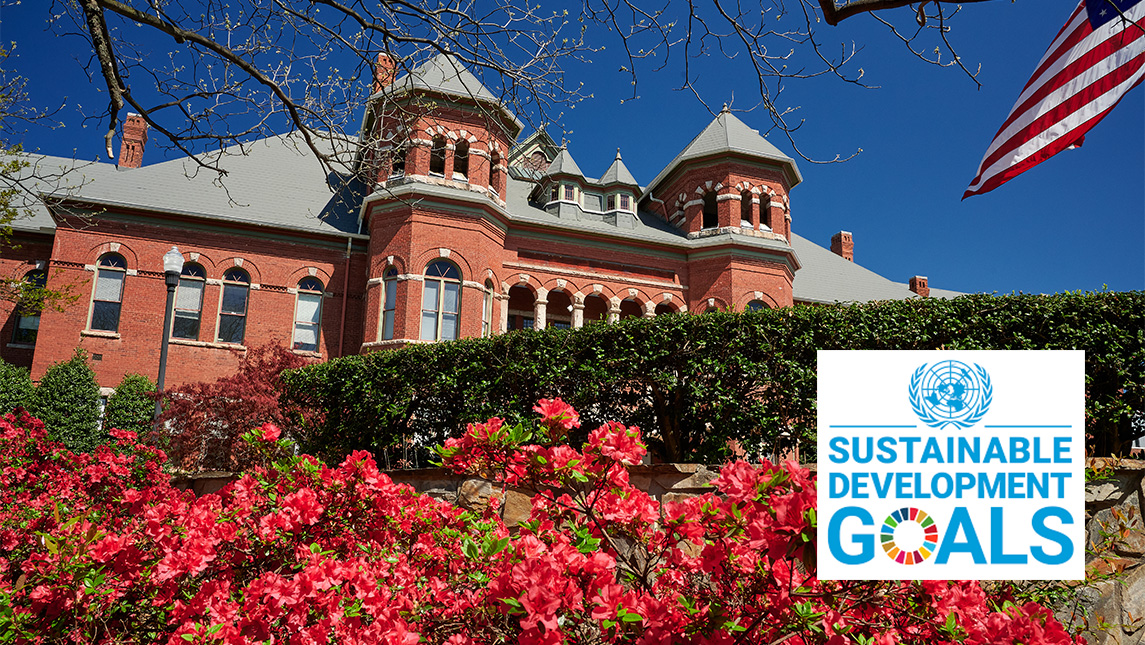
UNC Greensboro ranked in the top 200 universities worldwide for Reduced Inequalities and Sustainable Cities and Communities and is ranked overall in the top 40 percent out of more than 1,400 universities that participated in the Times Higher Education’s Impact Rankings for 2022.
The Times Higher Education (THE) rankings are the only global performance tables that assess universities across all 17 United Nations’ Sustainable Development Goals (SDGs), which were adopted by the UN in 2015 as a universal call to action to end poverty, protect the planet, and ensure that by 2030 all people enjoy peace and prosperity. They recognize that action in one area will affect outcomes in others, and that development must balance social, economic, and environmental sustainability.
“The Times Higher Education Impact Rankings are redefining excellence in global higher education – based on how universities are improving our world, not on traditional measures such as wealth and scholarly prestige,” says Phil Baty, Chief Knowledge Officer for THE. “It is inspiring to see such a large, diverse, and rapidly growing community of universities from all continents committed to subjecting themselves to scrutiny, to measure and demonstrate their impact, and to showcase best practices in delivering the Sustainable Development Goals. Students, as well as governments, are increasingly demanding such commitments and these demands will strengthen.”
Goal 10: Reduce Inequality
This calls for countries to “achieve and sustain income growth for the bottom 40 percent of the population at a higher rate than the national average; and to empower, promote the social, economic, and political inclusion of all, irrespective of age, sex, disability, race, ethnicity, origin, religion, or economic or other status.”
As one of the most diverse institutions in North Carolina, UNCG was recognized for its long history of providing access and opportunity to students from disadvantaged backgrounds and for its commitment to providing a safe and non-discriminatory learning, living, and working environments for all members of the University community. UNC Greensboro’s Equity, Diversity, and Inclusive Excellence Action Framework and Roadmap guides campus efforts to address racial inequality and promote equity, diversity, and inclusion for all individuals and groups that are marginalized.
Goal 11: Sustainable Cities and Communities
This calls for “inclusive and sustainable urbanization and capacity for participatory, integrated, and sustainable human settlement planning and management, and to protect and safeguard the world’s cultural and natural heritage.”
UNCG was recognized for its contributions to the local arts and for providing affordable public access to its libraries, the Weatherspoon Museum of Art, and the Downtown Greensboro Project Space. The Digital Library on American Slavery was also recognized for “preserving intangible cultural heritage such as local folklore, traditions, languages, and knowledge.” The library was recognized by the National Park Service (NPS) as the first-ever “virtual” stop on the Underground Railroad Network to Freedom.
The university was also recognized for its commitment to design all new construction to the United States Green Building Council’s Leadership in Energy and Environment Design standards; for promoting sustainable transportation options, and for prioritizing pedestrian access on campus. The 2020 Campus Plan supports carbon emissions reduction targets by focusing on transportation demand management with priority given to the accessible pathways, and bicycle and transit networks. Additionally, employees and students receive free access to bus rides via the Greensboro Transit Authority.
The Center for Housing and Community Studies, a community-engaged, applied research institution specializing in geospatial research and multi-modal data collection was recognized for working with local authorities to address planning and development issues that help ensure local residents are able to access affordable housing.
Other ranking achievements
The university also received high marks in Quality Education (Goal 4), Clean Water and Sanitation (Goal 6); and Climate Action (Goal 13).
“The United Nations’ Sustainable Development Goals are a call to action for people, the planet, and prosperity from more than 170 participating countries,” said Sean MacInnes, UNCG Sustainability Specialist.
“With 169 targets, the goals reflect the interconnectedness of all life on the planet and that sustainability is so much more than recycling and reducing our carbon footprint. These results are a testament to how intertwined sustainability is with UNCG’s curriculum and operations. This is a team effort, and we have a great team. And there’s opportunity for everyone to be involved, often in unexpected ways.”
“I think it’s also rewarding for UNCG to be recognized for our inclusion of aesthetics in our definition of sustainability,” said MacInnes. “That the SDGs call for protecting the world’s cultural and natural heritage speaks significantly to the importance of the arts and of the capacity storytelling has, in all of its forms, to connect us to one another and to move us to action.”
Story by Sean MacInnes, UNCG Office of Sustainability
Photography by Grant Gilliard, University Communications


